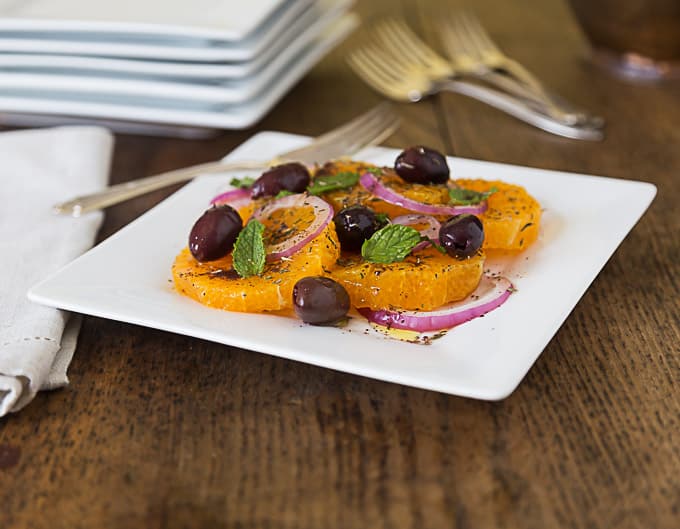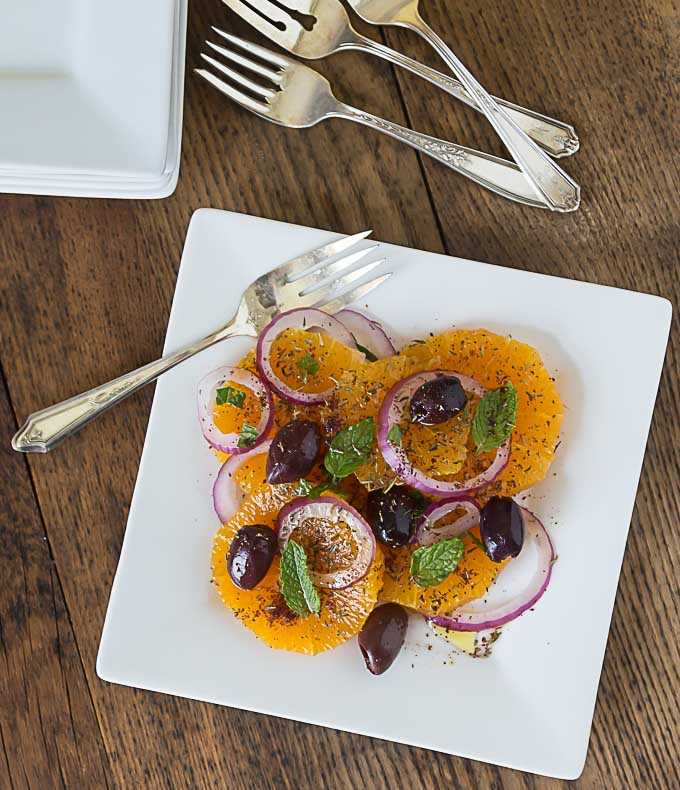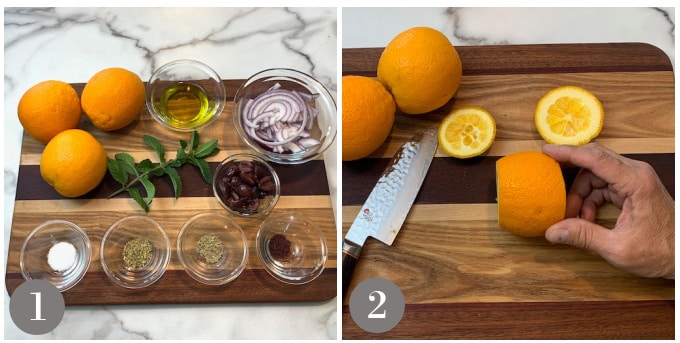This Turkish orange and onion salad or portakal salatasi is one of my go-to dishes to serve during the summer heat and goes great with grilled meat. When it is too hot to turn on the stove or oven and the cooking has moved outdoors this is a hit. This dish also comes together in about 5 minutes! So fresh and easy!

[feast_advanced_jump_to]
Portakal Salatasi aka Orange Salad is the Turkish name for this dish. Portakal is derived from Portugal. What's the connection? Well, at one point in time the best oranges came from Portugal. Oranges were famous. So famous that Arabs changed the name from naranj to porteghal. Interestingly enough, the word for orange in Spanish is naranja. This word comes from an old Sanskrit term naga ranga. Similar words are fascinating! By the way... my Puerto Rican friend told me oranges are called chinas in Puerto Rico.
Orange and onion salad is what you've been waiting for and is a great addition to any summer menu. It's light, refreshing, and a nice deviation from the usual greens. Bonus, no heavy or processed dressings. The simple dressing of olive oil, and herbs doesn't overshadow the sweetness of the oranges. If you like sweet and savory flavors mixed together then you will love the sweet orange mixed with salty olives, crisp onion flavor and a hint of herbs. I use extra mint to add even more depth of flavors. I love this salad!
Oranges likely originated in Malaysia (SE Asia). They made their way to China around 2200 B.C. The emperor often received oranges. People admired oranges for their medicinal properties and the aromatic value of their essential oils.
Eventually, oranges made it to Europe via the Silk Road traders. By the end of the second century A.D. they were featured at the lavish banquets of the Roman aristocracy. Christopher Columbus brought oranges to the New World. He planted the first orange tree in the Americas. The first American plantation of oranges was in St. Augustine, Florida. Later, during the gold rush in California, certain unscrupulous doctors made a hefty profit by selling orange juice to scurvy afflicted prospectors. The dose? A spoonful! Oranges have a really fascinating history and you can read more at Fruit Stand history of oranges page.





I like to use sweet naval oranges that are seedless.
What is sumac that is used in the dressing?
Sumac is a dried spice that is popular in Middle Eastern cooking. It adds tangy and a slightly floral note of flavor. Sumac has a nice acidic flavor like lemon zest but is not bitter.
How long can I store this salad in the refrigerator?
It is best to eat this fresh but you can store it for 3-4 days sealed in a container.
Needless to say, this orange salad goes perfect with grilled kebabs or any other grilled meat for that matter. Take it to your next picnic, and your friends will love you for bringing Turkish food. Or, enjoy it as a quick side to a weeknight meal. It's a great and delicious way to get your vitamin C.
This recipe was adapted from the book "The Complete Book of Turkish Cooking" by Ghillie Basan.

Print
Turkish or Portakal Salatasi orange and onion salad goes perfect with grilled kebabs or any other grilled meat for that matter. Take it to your next picnic, and your friends will love you. This has a nice contrast of flavors of sweet and savory.
Course Salad
Cuisine Turkish
Keyword fresh ingredients, healthy, low calorie, low fat, sweet and savory
Prep Time 5 minutes minutes
Cook Time 1 minute minute
Total Time 6 minutes minutes
Servings 6 servings
Calories 108kcal
Author Analida Braeger
What type of oranges do I use?
I like to use sweet naval oranges that are seedless.
What is sumac that is used in the dressing?
Sumac is a dried spice that is popular in Middle Eastern cooking. It adds tangy and slightly floral note of flavor. It an adds a nice acidic flavor like lemon zest but is not bitter.
How long can I store this salad in the refrigerator?
It is best to eat this fresh but you can store it for 3-4 days sealed in a container.

[feast_advanced_jump_to]
Dish Origins
Portakal Salatasi aka Orange Salad is the Turkish name for this dish. Portakal is derived from Portugal. What's the connection? Well, at one point in time the best oranges came from Portugal. Oranges were famous. So famous that Arabs changed the name from naranj to porteghal. Interestingly enough, the word for orange in Spanish is naranja. This word comes from an old Sanskrit term naga ranga. Similar words are fascinating! By the way... my Puerto Rican friend told me oranges are called chinas in Puerto Rico.
Orange and onion salad is what you've been waiting for and is a great addition to any summer menu. It's light, refreshing, and a nice deviation from the usual greens. Bonus, no heavy or processed dressings. The simple dressing of olive oil, and herbs doesn't overshadow the sweetness of the oranges. If you like sweet and savory flavors mixed together then you will love the sweet orange mixed with salty olives, crisp onion flavor and a hint of herbs. I use extra mint to add even more depth of flavors. I love this salad!
Orange History
Oranges likely originated in Malaysia (SE Asia). They made their way to China around 2200 B.C. The emperor often received oranges. People admired oranges for their medicinal properties and the aromatic value of their essential oils.
Eventually, oranges made it to Europe via the Silk Road traders. By the end of the second century A.D. they were featured at the lavish banquets of the Roman aristocracy. Christopher Columbus brought oranges to the New World. He planted the first orange tree in the Americas. The first American plantation of oranges was in St. Augustine, Florida. Later, during the gold rush in California, certain unscrupulous doctors made a hefty profit by selling orange juice to scurvy afflicted prospectors. The dose? A spoonful! Oranges have a really fascinating history and you can read more at Fruit Stand history of oranges page.

Steps to make Turkish Orange and Onion Salad

- Step 1: Gather your ingredients and have them measured out and ready: 3 oranges, 1 red onion sliced thin, Kalamata olives, salt, olive oil, thyme, oregano, sumac and mint leaves.
- Step 2: Slice the ends of the orange starting with the stem side then the bottom as shown.

- Step 3: Angle your knife to cut around the edge of the orange.
- Step 4: Saw gently keeping it close to the juicy flesh until you hit the bottom.

- Step 5: The edge will look like it has a stripe. Keep cutting around the edge until all the peel has been removed. You can clean up the white pith as you go just leaving the flesh.
- Step 6: Make slices from top to bottom that are about ¼ of an inch thick. Place the oranges, onions and olives on a platter.

- Step 7: Add the olive oil, thyme, oregano, and sumac to the oil.
- Step 8: Whisk to combine then drizzle over the oranges, olives and onions. Garnish with mint leaves and sprinkle with salt to taste.
Frequently Asked Questions
What type of oranges do I use?I like to use sweet naval oranges that are seedless.
What is sumac that is used in the dressing?
Sumac is a dried spice that is popular in Middle Eastern cooking. It adds tangy and a slightly floral note of flavor. Sumac has a nice acidic flavor like lemon zest but is not bitter.
How long can I store this salad in the refrigerator?
It is best to eat this fresh but you can store it for 3-4 days sealed in a container.
Needless to say, this orange salad goes perfect with grilled kebabs or any other grilled meat for that matter. Take it to your next picnic, and your friends will love you for bringing Turkish food. Or, enjoy it as a quick side to a weeknight meal. It's a great and delicious way to get your vitamin C.
Other Turkish Recipes
- Gavurdagi - A traditional salad of cucumbers, tomato, parsley and walnuts with a tangy sweet dressing made from pomegranate molasses.
- Ezeme - A spicy salsa made with roasted peppers and tomatoes.
- Poğaças - A cheese filled pastry that is like a biscuit and similar to cheese fatayer.
- Nohutlu mücver - Chickpea patties with red onion, parsley and other spices.
- Talas Kebabi - A flakey puff pastry filled with spiced beef.
- Turkish Style Rack of Lamb - A very unique blend of spices coat this lamb that is served with a mint yogurt sauce.
This recipe was adapted from the book "The Complete Book of Turkish Cooking" by Ghillie Basan.

Turkish Orange and Onion Salad Recipe
Turkish or Portakal Salatasi orange and onion salad goes perfect with grilled kebabs or any other grilled meat for that matter. Take it to your next picnic, and your friends will love you. This has a nice contrast of flavors of sweet and savory.
Course Salad
Cuisine Turkish
Keyword fresh ingredients, healthy, low calorie, low fat, sweet and savory
Prep Time 5 minutes minutes
Cook Time 1 minute minute
Total Time 6 minutes minutes
Servings 6 servings
Calories 108kcal
Author Analida Braeger
Ingredients
- 3 oranges cut into slices ( sweet naval oranges work nicely)
- 1 red onion sliced thin
- 8 Kalamata olives
- ½ tsp Kosher salt to taste
Dressing:
Instructions
Prepare the salad:
- Peel the oranges and remove the surrounding pith.
- Slice oranges to a thickness of ¼" and place on a large serving platter.
- Slice onion thinly and place them over the oranges.
- Scatter the olives on top.
Prepare the Dressing:
- In a small bowl whisk together olive oil, thyme, sumac and oregano.
- Drizzle over the oranges and onions.
- Serve with a sprinkling of salt and mint garnish.
Notes
Frequently Asked Questions:What type of oranges do I use?
I like to use sweet naval oranges that are seedless.
What is sumac that is used in the dressing?
Sumac is a dried spice that is popular in Middle Eastern cooking. It adds tangy and slightly floral note of flavor. It an adds a nice acidic flavor like lemon zest but is not bitter.
How long can I store this salad in the refrigerator?
It is best to eat this fresh but you can store it for 3-4 days sealed in a container.
